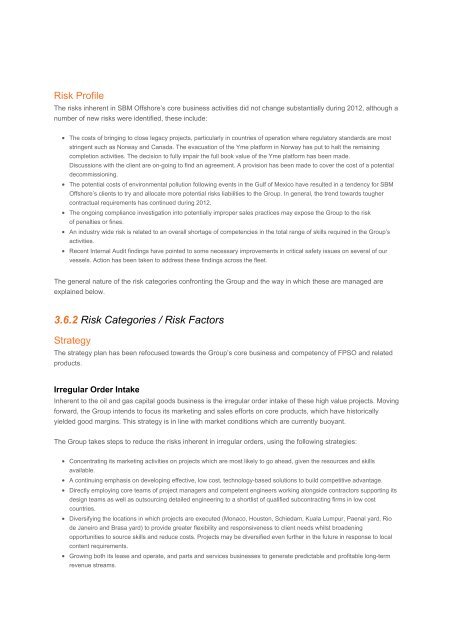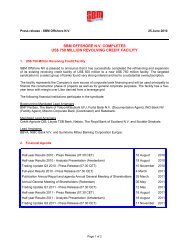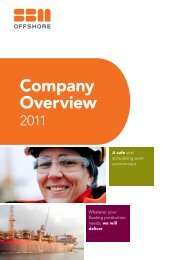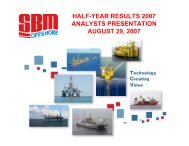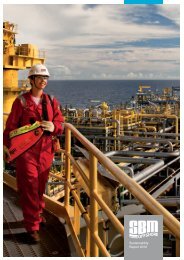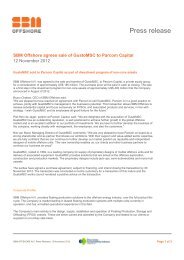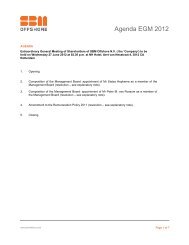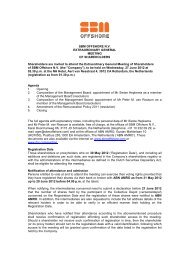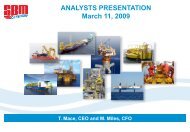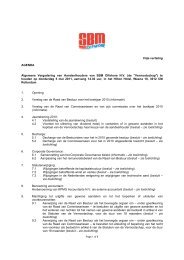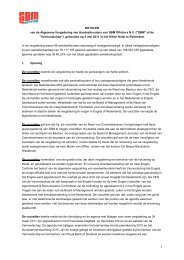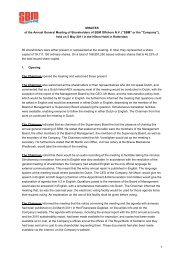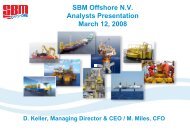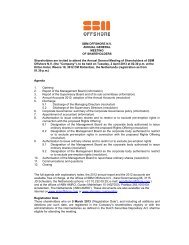2012 Sustainability selection - SBM Offshore
2012 Sustainability selection - SBM Offshore
2012 Sustainability selection - SBM Offshore
Create successful ePaper yourself
Turn your PDF publications into a flip-book with our unique Google optimized e-Paper software.
Risk Profile<br />
The risks inherent in <strong>SBM</strong> <strong>Offshore</strong>’s core business activities did not change substantially during <strong>2012</strong>, although a<br />
number of new risks were identified, these include:<br />
• The costs of bringing to close legacy projects, particularly in countries of operation where regulatory standards are most<br />
stringent such as Norway and Canada. The evacuation of the Yme platform in Norway has put to halt the remaining<br />
completion activities. The decision to fully impair the full book value of the Yme platform has been made.<br />
Discussions with the client are on-going to find an agreement. A provision has been made to cover the cost of a potential<br />
decommissioning.<br />
• The potential costs of environmental pollution following events in the Gulf of Mexico have resulted in a tendency for <strong>SBM</strong><br />
<strong>Offshore</strong>’s clients to try and allocate more potential risks liabilities to the Group. In general, the trend towards tougher<br />
contractual requirements has continued during <strong>2012</strong>.<br />
• The ongoing compliance investigation into potentially improper sales practices may expose the Group to the risk<br />
of penalties or fines.<br />
• An industry wide risk is related to an overall shortage of competencies in the total range of skills required in the Group’s<br />
activities.<br />
• Recent Internal Audit findings have pointed to some necessary improvements in critical safety issues on several of our<br />
vessels. Action has been taken to address these findings across the fleet.<br />
The general nature of the risk categories confronting the Group and the way in which these are managed are<br />
explained below.<br />
3.6.2 Risk Categories / Risk Factors<br />
Strategy<br />
The strategy plan has been refocused towards the Group’s core business and competency of FPSO and related<br />
products.<br />
Irregular Order Intake<br />
Inherent to the oil and gas capital goods business is the irregular order intake of these high value projects. Moving<br />
forward, the Group intends to focus its marketing and sales efforts on core products, which have historically<br />
yielded good margins. This strategy is in line with market conditions which are currently buoyant.<br />
The Group takes steps to reduce the risks inherent in irregular orders, using the following strategies:<br />
• Concentrating its marketing activities on projects which are most likely to go ahead, given the resources and skills<br />
available.<br />
• A continuing emphasis on developing effective, low cost, technology-based solutions to build competitive advantage.<br />
• Directly employing core teams of project managers and competent engineers working alongside contractors supporting its<br />
design teams as well as outsourcing detailed engineering to a shortlist of qualified subcontracting firms in low cost<br />
countries.<br />
• Diversifying the locations in which projects are executed (Monaco, Houston, Schiedam, Kuala Lumpur, Paenal yard, Rio<br />
de Janeiro and Brasa yard) to provide greater flexibility and responsiveness to client needs whilst broadening<br />
opportunities to source skills and reduce costs. Projects may be diversified even further in the future in response to local<br />
content requirements.<br />
• Growing both its lease and operate, and parts and services businesses to generate predictable and profitable long-term<br />
revenue streams.


